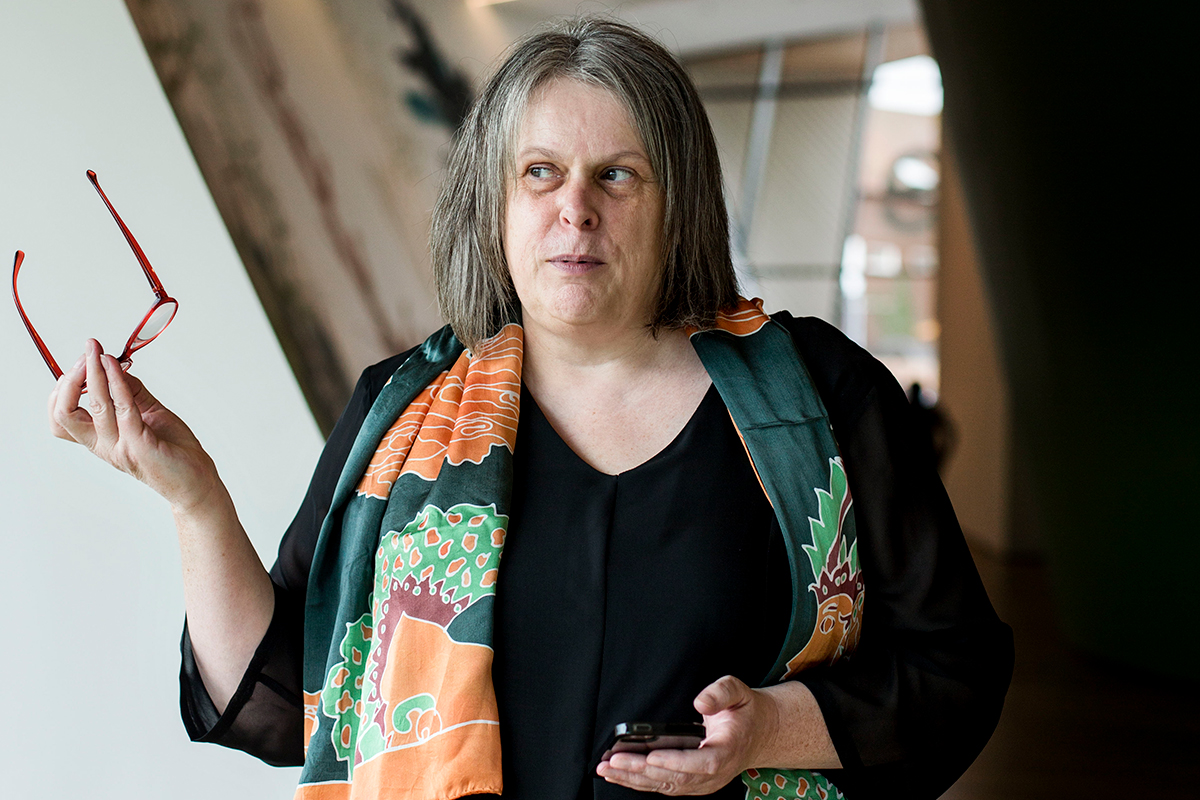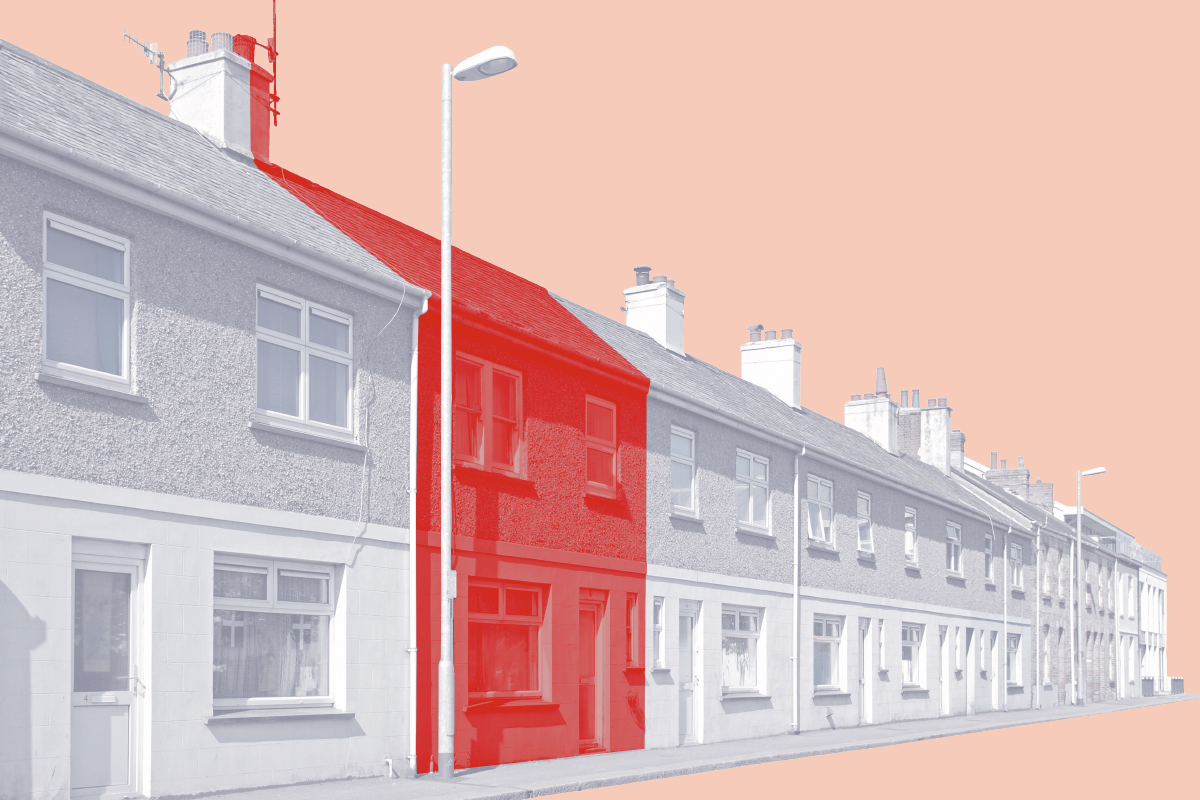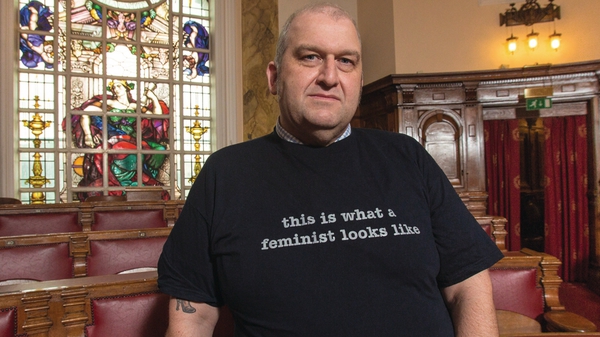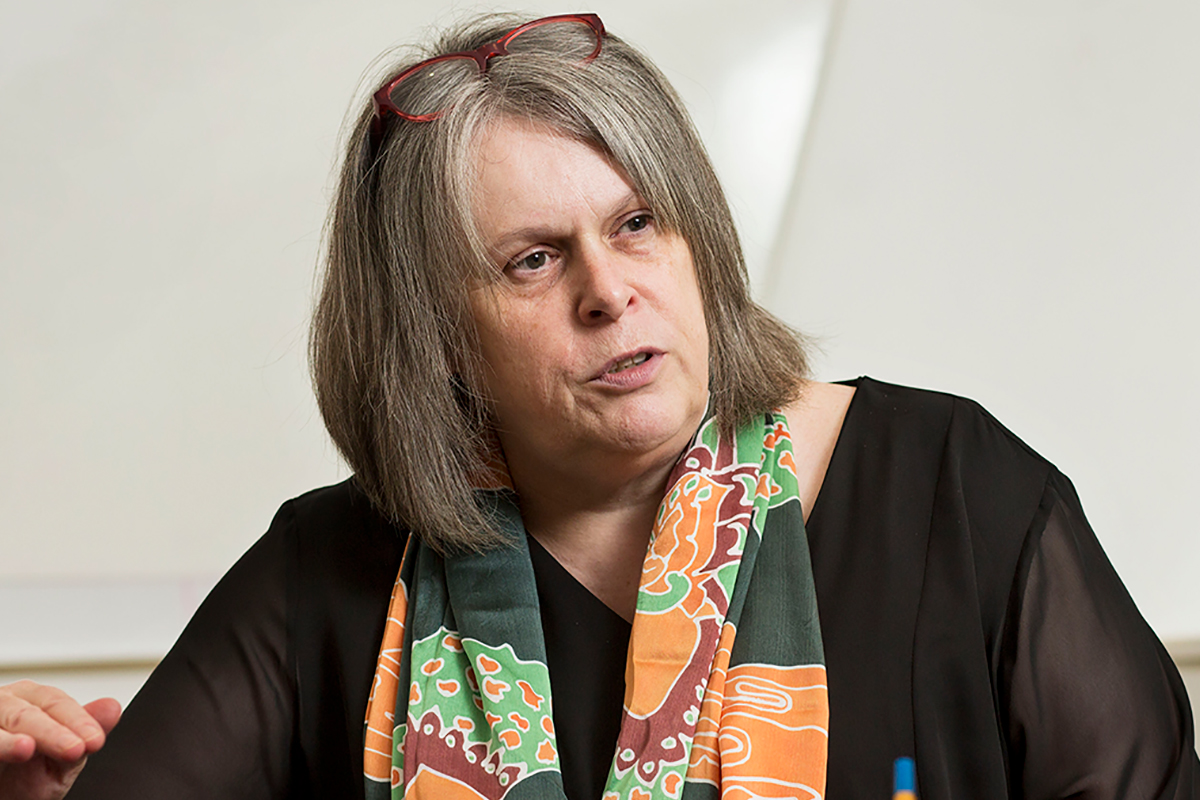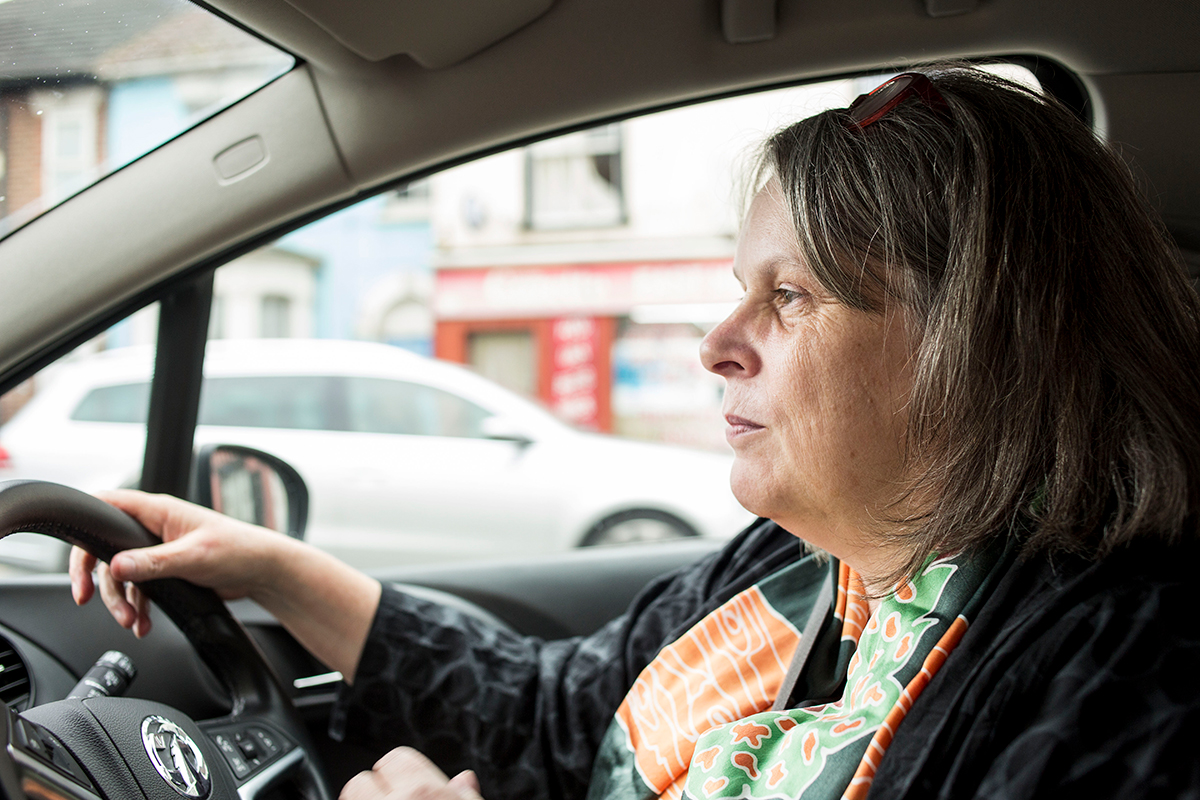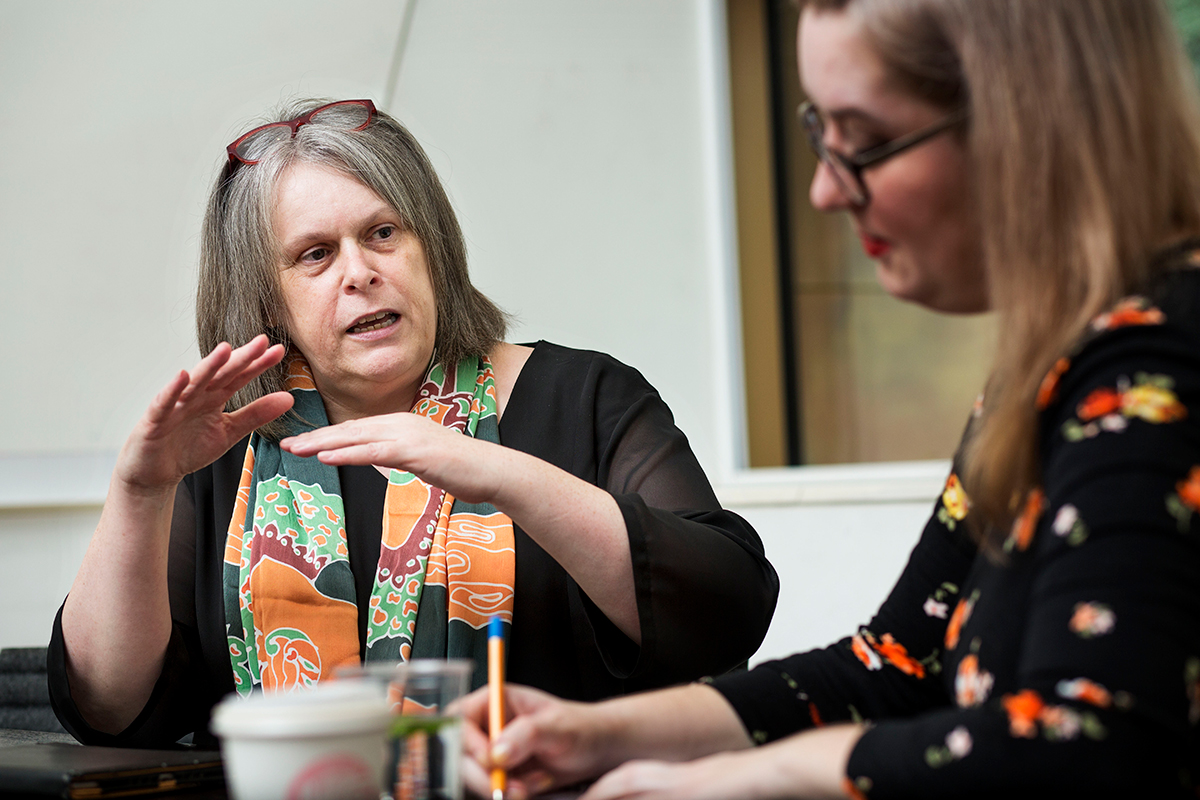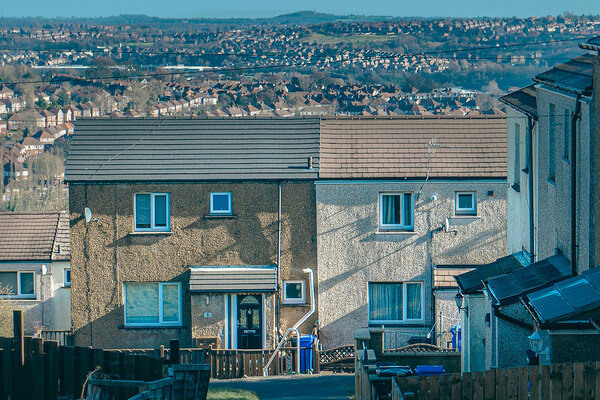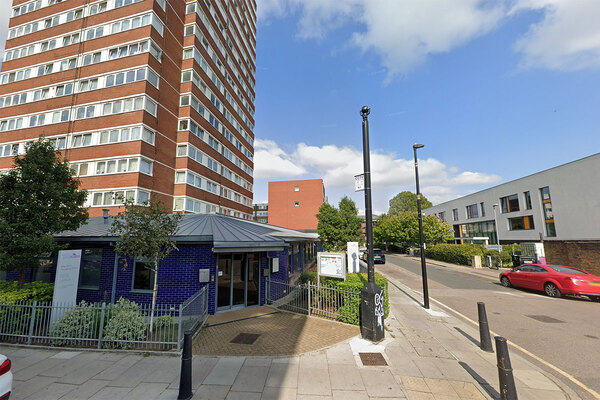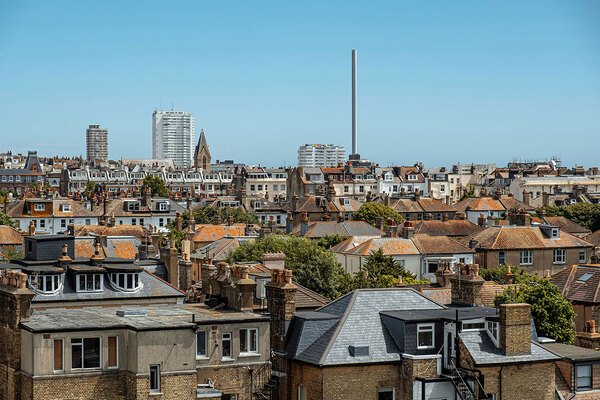In conversation with Alison Inman
The president of the Chartered Institute of Housing talks to Dawn Foster about domestic abuse, the legacy of Grenfell, and how to end the housing crisis. Photography by Tim Foster
Nestled behind Colchester Castle is the modern art gallery Firstsite. Alison Inman has suggested we meet at the gallery – near where she lives – for a coffee, and on arrival she appears to be on first name terms with all the staff, from the receptionists to the baristas.
The new president of the Chartered Institute of Housing is also a friendly face at myriad social housing conferences and events, but her tenure has begun at a serious time for the sector.
Amid the fallout from the Grenfell disaster, the chronic underfunding of social housing, and immense housing demand, Ms Inman will have to publicly battle to make the sector’s voice heard while most of Westminster’s energy is focused on Brexit.
She speaks to Inside Housing about her priorities and the challenges she sees for the sector in the year ahead.
You’ve said domestic abuse will be the focus of your presidency. What can the sector do to improve?
Housing in England can learn from housing in Wales. When Carl Sargeant was [housing] minister, ably helped by Tamsin Stirling, he did some incredible stuff. Every housing provider in Wales has to have a domestic abuse policy. They don’t in England; in England they have to have an anti-social behaviour [policy]. Seven women a month are not dying because of anti-social behaviour – they’re dying because of domestic abuse.
What should a domestic abuse policy look like?
I think it’s about being people-centred. It’s predominantly a gendered crime. Not only are women traumatised – and their children traumatised – by abuse, they’re then moved, and I think there are other ways of doing that.
So when violence is exposed, partners tend to stay at home because of tenancy laws. Women often have to leave pets behind and that’s a huge psychological burden because although it seems trivial, pets are part of the family. The children have an enormous connection with their pets, and with all the other upheavals that can be deeply upsetting. And we also know that pets are often used as tools in domestic abuse: either attacking the pet, threatening to kill the animals, or trying to turn animals against individuals.
And then on top of that, given most people are only a month away from eviction in terms of cash flow, how can you expect women who are being financially controlled to find enough money to rent a new home, given how hostile private landlords are to tenants both with children and on benefits? And social housing providers don’t have a huge surplus of stock to enable a swift and smooth move.
Housing providers have to be people-centred. Some women absolutely need a safe space immediately, they need to be in a refuge. But I’m hearing now from Women’s Aid and other organisations that increasingly women are telling them they don’t want to go into refuges, because moving is stressful enough, and they know the next move will be traumatic enough, and they fear being trapped in the refuge for a long time, when they want to get on with their life.
"One thing I’ve learned is that one of the biggest indicators of domestic abuse is rent arrears."
In Wales, every public housing provider has a duty to ‘ask and act’ if they suspect domestic abuse: they have to sensitively and carefully ask if they think there’s a possibility.
One thing I’ve learned is that one of the biggest indicators of domestic abuse is rent arrears. Often when we think of abuse, we think just of people hitting each other, but financial abuse is a big part of coercive control. So every time we have a conversation about rent arrears, we should be sensitive to the possibility of abuse.
We send people in to do repairs all the time in the social sector, so if you’re replacing a door that has a hole in it and you’ve done it twice before, that should ring alarm bells. There’s still under-reporting – people are still afraid and unsure who to ask, and sometimes it’s easier to have a conversation with someone who’s not a specialist, and that can be done safely. Everyone can be trained to do this.
We live in a country that values homeownership above everything else: that’s the context we live in. One of the interesting things about Grenfell was that we saw the result of a lot of unintended consequences. There were layers upon layers of complexity which made it a very difficult place to manage.
It seemed as if the issue was that every possible thing that could have gone wrong did go wrong, from day-to-day building management to top-level management issues. How can housing providers stop this happening again, when their work is so complex?
A housing association I’m on the board of had a small fire in a sheltered block. We don’t own it, but we manage it on behalf of someone else. And we had both done fire risk assessments, and both used different qualified, appropriate people – and they both came out differently. And if it’s done by the fire brigade it could be different again.
With Grenfell, one of the things it’s made me think is when housing organisations get complaints, we often work really hard to give ourselves assurance that everything’s fine. That’s the psychological approach we use. We’re not necessarily putting as much effort into giving the person who’s made the complaint the assurance they need. It can be people on the defence, but it can also be the fact people are worried and want to give themselves the assurance that it’s fine. Do we put as much effort into making sure the people who raised the complaint are reassured and happy with the outcome?
One thing that struck me about the Grenfell fire was that the death toll quickly overtook the number of fatalities at the Lakanal House fire in 2009. And it was immediately clear that firefighters accepted that the refurbishment had compromised the fireproofing of the original build, just as what happened at Lakanal. Did you think everything would change after the 2009 fire?
Yes. We talked about that as a game-changer. We’re managing such complex spaces and the pressure on resources is immense. After [Housing Revenue Account] reform, getting council housing to a space where we could afford to undertake these big transformational projects was life-changing. These people throughout the sector did it for the right reasons. I remember one of the things people were saying was about the cladding that on the planning application it mentioned that it would improve the aesthetics and that was what everyone zoned in on.
Yes, whenever I was on radio or TV, people would say with absolute authority that the cladding was purely aesthetic. Trying to push back against that involved a complexity of argument that a lot of the media weren’t keen on. They had a story and they wanted to run with it. What did you think about the wider media coverage of the fire and the circumstances?
It showed that we’ve not as a sector done a good enough job at explaining how housing works. We’ve been saying for a long time we wish more people talked about and understood housing. It shouldn’t have taken this loss of life and decimation of a community to get to this space.
But [housing sector] people like to feel that they’re experts, and feel that they’re close to government. But we also need to talk to communities.
I attended both Labour and Conservative party conferences. The Labour conference focused a lot on Grenfell Tower, but also the Brighton homelessness problem. And the frustration there was that we know how to end and deal with rough sleeping; it’s not like finding a cure for cancer – we can do it but we don’t have the resources.
At Labour the debate around regeneration was completely polarised. There’s a lot of work to do there: one person’s regeneration is another person’s social cleansing. I think it’s a particular issue in London. There’s a rhetoric since 2010 in the political sphere that you should not expect to be poor and live in London. And that’s led to people understandably reacting with fear when faced with big regeneration projects: they think there may not be a home for them in the future.
I think with Labour in particular, it’s an issue. There are a lot of regeneration projects in Labour councils in London where the right to return hasn’t been put in place. There’s a lot of resistance to plans in Lambeth, and to the Haringey Development Vehicle. How can these tensions be resolved?
I think there has to be more engagement with communities. I think there has to be more than just a ballot of communities, which was mentioned in Jeremy Corbyn’s speech. Regeneration needs to be properly led.
One of the issues at both the Conservative and Labour conferences was around the effects of austerity on planning departments. So if you look at the resources in a small district council up against a big developer, you haven’t got a fair fight.
It’s David and Goliath – it’s not surprising you don’t get the affordable housing councils want. It feels like housing has got to a place where nobody believes housing can be fixed. And it’s frustrating, because government does have the powers – its hands aren’t completely tied.
Is it because it’s become hugely complex, or is it because we need to rethink social housing and get back to that mission, or is it that people are too scared to confront the fact that no matter what happens, one of the effects of solving the housing crisis will be that house prices come down?
I think it’s so complex and it’s so far-reaching it’s been cast into a box labelled “too hard to solve”. We have a history of looking for massive structural solutions and I’m not sure that will work well in the world any more.
We’ve had this rhetoric of “homeownership good, all other tenures bad” for such a long time and I honestly believe we can’t fix this unless we fix every part of the market. And you have to pay for that.
We’ve seen through Help to Buy and stamp duty there’s lots of money for housing. It’s not that the government isn’t spending money, it’s that it’s diverted incorrectly. And with social housing, you pay for it upfront, or you pay for it in perpetuity.
Do you think the argument about return on investment has been made strongly enough? Or do we not talk enough about how housing is the bedrock of society? Poor housing costs more in health, education and housing benefit.
Think of supported housing. That could be a mother and baby unit: you can pay for that, or you can pay for a child to be taken into care, and what impact does that have on the life chances of both the mother and baby?
People with complex needs over addiction, supported housing for them is so much cheaper than putting someone in prison repeatedly.
Social housing isn’t about giving someone a house for free. It’s a social good and yes, it saves money, but it does far more than that. It changes lives, and that’s the argument we have to win with government: stop fetishising homeownership, fix every part of the housing crisis, and [recognise that] social housing is an immense social good that saves money and transforms lives and communities.
8.12.17 Update: This story erroneously referred to Carl Sergeant as having been first minister, and has been corrected with his actual role, which was housing minister.
